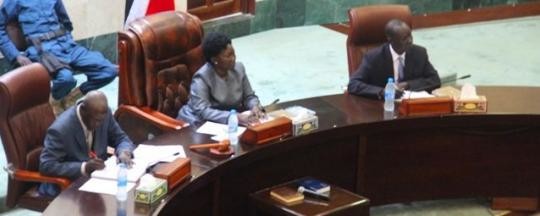Following a summons by the National Legislative Assembly, South Sudan’s central bank governor announced Thursday that the official foreign exchange rate will increase from 2.96 South Sudanese pounds per US dollar to 4.50 to match the black market rate.
Bank governor Kornelio Koriom’s announcement comes after he and the minister of finance and economic planning were questioned by lawmakers Wednesday over the dual foreign exchange markets in South Sudan.
Earlier this month, the legislature ordered an investigation into the Central Bank over the black market for dollars.
Koriom told lawmakers that the negative effect of maintaining a dual foreign exchange market is immense and the bank of South Sudan is very concerned about its existence.
However, he said there are challenges facing the decision to unify the rates, saying there should be increased salaries for employees and austerity measures implemented first.
Unable to supply cash to banks
Koriom blamed the existence of dual dollar exchange market in South Sudan as an inheritance from Sudan, which he said has suffered from this problem for decades before the South’s independence.
Koriom admitted that money given to foreign exchange bureaus by the Bank of South Sudan often finds its way to the black market.
He said the Bank has deployed over 60 security agents to those bureaus to control the movement of hard cash.
Koriom said the supply of currency to commercial banks has been made difficult by the war, which has cut oil production in Unity State and Upper Nile states from 350,000 barrels per day before the conflict to 160,000 barrels today.
“[Previously] during the hard times we took loans from oil companies, so we are now refunding $160,000 monthly and the remainders go to the Khartoum government [for pipeline fees],” he explained.
“Thus we are unable to give hard currency to commercial banks because what is supposed to be given to [them] goes to government institutions.”
South Sudan’s government currently owes over 1.6 billion US dollars to oil companies, who rejected a government request in early August to borrow an addition 200 million dollars.
At that time, presidential spokesperson Ateny Wek said the government was struggling to pay soldiers’ salaries.
Photo: Second Deputy Speaker Hon Yasmin Samuel chaired the sitting in September ordering an investigation into the Central Bank
To contact Radio Tamazuj with press releases, comments or information, write to radiotamazuj@gmail.com with full name and contact information




